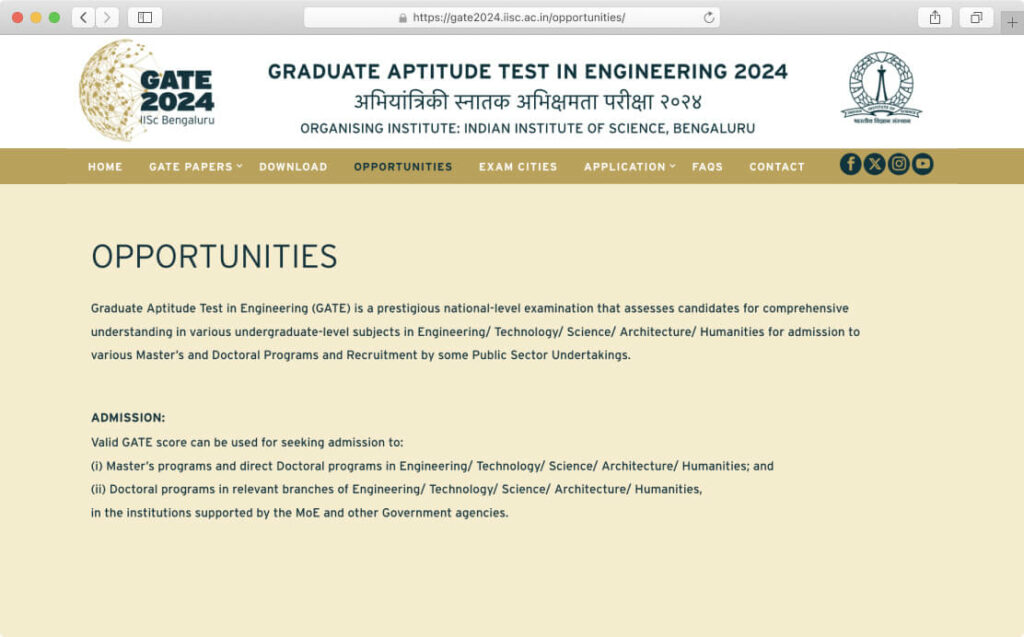Are you aspiring to pursue a career in architecture & Urban Planning? Do you want to study Architecture and Urban Planning Master degree at well reputed and Central, State funded universities or Institute of national importance? If so, the GATE Architecture exam can be your gateway to success. The Graduate Aptitude Test in Engineering also known as GATE AR is an esteemed examination. It unlock the gateway to access world class insitution’s infrastructure such as Library, access to research journals and interaction with trained faculties to study Urban planning and Architecture Master course.
GATE AR exam evaluates the comprehensive understanding of candidates in various engineering subjects, including architecture. The GATE Architecture exam caters explicitly to individuals aspiring to pursue a master’s degree in Architecture & Urban Planning and allied fields. So technically, it will open your door to higher education in architecture & planning. GATE Architecture exam score is also important for some of the PSUs recruitment.
Most of the students faces difficulties while stating the preparation for GATE AR exam, we have prepared a comprehensive guide that will walk you through the process of getting started with your GATE Architecture exam preparation.
This article will provide insights into the exam structure, to excel in this highly competitive test. So let’s dive into this educational guide and equip ourselves with everything necessary for a successful GATE Architecture exam experience.
The Importance of GATE Architecture Exam for Master Degree Admission, PSUs Recruitment, and Jobs
Firstly Graduate Aptitude Test in Engineering (GATE) architecture exam is very important and mandatory exam for students and aspirants to pursue a master’s degree in architecture, Urban Planning & some of the related courses.
Secondly it serves as a gateway to prestigious educational institutions across India (IITs, NITs, SPAs & other institutions), offering admission to postgraduate programs in architectural specialization(M.Arch), Urban planning, regional planning, Transportation planning, GIS & remote sensing, and related fields.
Most Importantly GATE architecture exam evaluates a candidate’s understanding of various architectural concepts, design principles, planning techniques, and building materials. By excelling in this examination, candidates can secure their spot in renowned universities and expand their knowledge base while honing their skills under the guidance of experienced faculty members.
A high GATE score can provide an edge in the job market, leading to promising career prospects and financial stability.
Not only does the GATE architecture exam play a pivotal role in securing admission to master’s degree programs. It also opens up opportunities for recruitment by Public Sector Undertakings (PSUs).
Eligibility Criteria for GATE Architecture Exam:
Aspirants can find details of eligibility criteria on GATE official website.
A student or candidate who is currently studying in the 3rd or higher years of any undergraduate degree program OR has already completed any government-approved degree program in Engineering/ Technology/ Architecture/ Science/ Commerce/ Arts is eligible for appearing in the GATE Architecture.
Age Limit: The GATE exam has no age limit, allowing individuals of all ages to apply.
Nationality: The GATE Architecture exam is open to Indian and international candidates.
Exam Pattern:
Understanding the GATE exam pattern is crucial for developing a strategic preparation plan. The GATE Architecture exam pattern is designed to assess the architectural, design and urban planning knowledge and skills of aspirants. Students should have brief understanding of the structure of the exam, which will also act as a key to preparing effectively for GATE Architecture exam.
The exam consists of a single paper with a total of 65 questions carrying 100 marks. The duration of the examination is three hours. Questions are designed in such a way that it will test abilities to Recall, Comprehension, Application of subject matter, Analysis & Synthesis.
GATE paper consists of three types of questions, Multiple Choice Questions (MCQ), Multiple Select Questions (MSQ) and/or, Numerical Answer Type (NAT) Questions
GATE exam paper is consists of 2 sections:
Part A (15 marks):
This section contains General Aptitude questions designed to test the candidates’ language, analytical, and reasoning skills. It is common to all GATE papers and aims to assess the students’ basic cognitive abilities.
Part B (85 marks):
This section focuses on the core subject, Architecture and Planning. It assesses the candidates’ knowledge and understanding of various architectural concepts, design principles, and planning techniques. The questions in this section are specific to the GATE Architecture exam.
Syllabus:
We have written a detailed blog post about the GATE Architecture paper syllabus here.
Preparation Strategies for GATE Architecture
The preparation strategy for GATE Architecture and Planning starts with being familiar with the course material. Candidates need to invest in fixed number of hours on a daily basis for the preparation. Online resources such as study materials, video lectures, etc., should be fully utilized by candidates. GATE AR aspirants should refer to previous year GATE question papers on regular basis. However it will take some time to make it habit but it can help students to gain an understanding of the main topics and types of GATE AR.
Being organized and maintaining a disciplined approach towards preparing for the exam is essential in order to excel at this level of exam. A planned strategy is necessary quality that needs to be worked upon to build it up into a strong foundation before taking on the challenge of the GATE Architecture and Planning exam. Solving practice tests within the allotted time frame would help boost confidence among candidates. This also helps them identify their weaker sections so that more time can be devoted there during the last few days before taking up the test. Regular revision should not be missed upon if one wants to secure good marks in this entrance exam.

